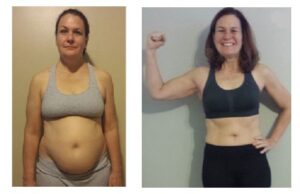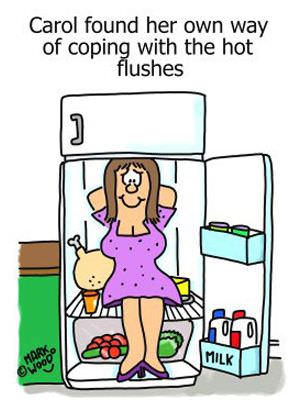Let me paint you a picture: Sarah, a vibrant 48-year-old client of mine, came to me utterly frustrated. “I’ve always been the same weight” she lamented, “I’m eating less, exercising more, but the scale keeps creeping up. What’s going on?”
Sarah’s story is far from unique. Many women find themselves blindsided by unexpected weight gain as they approach menopause. If I had a dollar for every time I heard “nothing I do works anymore” then I’d be driving something faster than a Kia Sportage.
But here’s the good news: while this challenge is common, it’s far from insurmountable.
With the right knowledge and strategies, you can navigate this transition and emerge stronger, fitter, and more confident than ever. In this comprehensive guide, we’ll delve into the intricacies of midlife weight gain, debunk some common myths, and equip you with practical, science-backed strategies to help you maintain a healthy weight through menopause and beyond. So, let’s roll up our sleeves and get stuck in!
But first.. Let’s address the elephant in the room:
I’m a 35-year-old white guy writing about menopause. Trust me, the irony isn’t lost on me. I’m not here to ‘mansplain’ women’s health – I’m acutely aware that no woman wakes up thinking, “Gee, I can’t wait to learn about menopause from a man today!”
But here’s the deal: while I can’t personally relate to hot flashes or mood swings, I’ve got a decade of experience coaching women over 40, an exercise physiology degree, and a genuine passion for helping women navigate this transformative phase. Consider this article my attempt to spare us both the awkwardness of having these conversations face-to-face!

Understanding Menopause: More Than Just Hot Flashes
When we talk about menopause, it’s crucial to understand that we’re not just referring to a single moment in time. Rather, it’s a gradual transition that typically spans several years. Let’s break it down:
The Three Stages of Menopause
- Perimenopause: This is the lead-up to menopause, typically starting in your 40s. During this time, your body begins to produce less oestrogen, leading to irregular periods and the onset of some menopausal symptoms.
- Menopause: Technically, menopause is defined as the point when you’ve gone 12 consecutive months without a menstrual period. This usually occurs between the ages of 45 and 55.
- Postmenopause: This is the period after menopause, when your body has adjusted to lower hormone levels.
The Hormonal Roller Coaster
During perimenopause, your body goes through significant hormonal changes. Oestrogen and progesterone levels fluctuate wildly, which can lead to a host of symptoms:
- Hot flashes and night sweats
- Mood swings
- Sleep disturbances
- Changes in libido
- Vaginal dryness
- And yes, changes in weight and body composition

It’s important to note that these changes don’t happen overnight. The transition to menopause is gradual, often taking place over several years. This gives us time to adapt and implement strategies to manage these changes effectively.
The Menopause-Weight Connection
Now, you might be wondering, “Does menopause itself cause weight gain?” The answer isn’t a simple yes or no. While hormonal changes can influence your weight, they’re not the sole culprit. In fact, research shows that the average weight gain during the menopausal transition is about 2.5-4 kilograms.
However, this doesn’t mean you’re destined to gain weight. Many factors contribute to midlife weight gain, and understanding these can help you develop effective strategies to maintain a healthy weight.
The Truth About Metabolism and Menopause
One of the most persistent myths about menopause is that it causes your metabolism to crash, making weight gain inevitable.
Let’s set the record straight: it doesn’t.
Debunking the “Slow Metabolism” Myth
While it’s true that our metabolism tends to slow down as we age, this isn’t solely due to menopause. Several factors contribute to this gradual slowdown:
- Loss of muscle mass: As we age, we naturally lose some muscle mass. Since muscle burns more calories than fat, this can lead to a slightly slower metabolism.
- Decreased activity levels: Many of us become less active as we get older, often due to work commitments, family responsibilities, or health issues.
- Changes in sleep patterns: Poor sleep, which is common during menopause, can affect hormones that regulate hunger and fullness.
- Stress: Midlife often brings increased stress, which can lead to hormonal changes that promote weight gain.
The Real Impact of Hormonal Changes
While hormonal changes during menopause don’t directly cause significant weight gain, they can influence where fat is stored in your body. As oestrogen levels decrease, fat tends to shift from the hips and thighs to the abdomen. This is why many women notice changes in their body shape, even if the number on the scale doesn’t change dramatically.
Why Your Old Weight Loss Strategies Might Not Work
If you’re finding that the diet and exercise routines that worked for you in your 20s and 30s aren’t as effective now, you’re not alone. As our bodies change, so too must our approaches to health and fitness. Extreme diets or intense workout regimens that you might have relied on in the past can actually backfire now, potentially leading to increased stress, fatigue, and even injury.

The Hidden Culprits Behind Midlife Weight Gain
Now that we’ve cleared up some misconceptions, let’s look at the factors that really contribute to weight gain during the menopausal transition:
Sleep Disruptions: The Sneaky Saboteur
If you’re waking up multiple times a night, drenched in sweat, you’re not alone. Night sweats and insomnia are common during menopause, and they can wreak havoc on your weight management efforts. Here’s why:
- Hormonal imbalance: Poor sleep can disrupt the balance of hunger hormones (ghrelin and leptin), leading to increased appetite and cravings.
- Impaired decision-making: When you’re sleep-deprived, your prefrontal cortex (the part of your brain responsible for decision-making) doesn’t function optimally. This can lead to poor food choices.
- Increased stress: Lack of sleep is a form of stress on your body, which can lead to elevated cortisol levels. Chronically high cortisol can promote fat storage, particularly around the midsection.
The Hunger Games: Appetite Changes During Menopause
Many women report feeling hungrier during menopause, and there’s a biological basis for this. Fluctuating oestrogen levels can affect the production of leptin, a hormone that helps regulate fullness. This can lead to increased appetite and cravings, particularly for carbohydrate-rich foods.
The Activity Equation: Moving Less as We Age
As we get older, we often become less active. This could be due to:
- Time constraints: Juggling work, family, and other responsibilities can leave little time for exercise.
- Physical limitations: Joint pain or other health issues might make certain types of exercise more challenging.
- Decreased motivation: Fatigue and mood changes associated with menopause can sap your enthusiasm for physical activity.
Remember, even small decreases in daily movement can add up over time, contributing to gradual weight gain.
Stress: The Silent Weight Gainer
Midlife often brings a unique set of stressors – caring for aging parents, supporting children through major life transitions, navigating career changes, and dealing with your own health concerns. Chronic stress can lead to:
- Emotional eating and drinking: Many of us turn to food or alcohol for comfort when stressed.
- Increased cortisol production: As mentioned earlier, high cortisol levels can promote fat storage.
- Disrupted sleep: Stress often interferes with sleep, creating a vicious cycle.
Muscle Mass: Use It or Lose It
As we age, we naturally lose muscle mass – a process called sarcopenia. This is significant because muscle tissue burns more calories than fat tissue, even when you’re at rest. Less muscle means a slower metabolism, which can contribute to weight gain if calorie intake isn’t adjusted accordingly.
Rethinking Your Approach to Diet and Exercise
Now that we understand the unique challenges of managing weight during menopause, it’s time to look at how we can adapt our diet and exercise routines to meet these challenges head-on.
Nutrition Strategies for Menopausal Women
- Prioritise protein: Adequate protein intake is crucial for maintaining muscle mass and promoting satiety. Aim for a serving of lean protein with each meal.
- Focus on fibre: High-fibre foods can help you feel full and satisfied with fewer calories. Plus, they’re great for digestive health.
- Choose complex carbohydrates: Opt for whole grains, fruits, and vegetables over refined carbs. These provide steady energy and help balance blood sugar levels.
- Don’t fear fat: Healthy fats from sources like avocados, nuts, and olive oil are important for hormone production and can help you feel satisfied.
- Stay hydrated: Sometimes thirst can masquerade as hunger. Aim for at least 8 glasses of water a day.
Exercise: Quality Over Quantity
While regular physical activity is crucial, the type and intensity of exercise you do may need to change:
- Strength training: This is non-negotiable. Resistance exercises help maintain muscle mass and bone density, both of which tend to decrease with age.
- Interval Training (HIIT): Short bursts of intense activity can be more effective (and time-efficient) than long, steady-state cardio sessions.
- Low-impact activities: If joint pain is an issue, consider activities like swimming, cycling, yoga or stationary exercise equipment.
- Daily movement: Look for ways to increase your non-exercise activity throughout the day – take the stairs, park further away, or have walking meetings.

The Importance of Recovery
As we age, our bodies need more time to recover from intense exercise. Don’t be afraid to:
- Increase rest days: Allow more time between intense workouts.
- Practice active recovery: Light activities like walking, yoga and simply taking time to do something you enjoy can promote recovery without overtaxing your system.
- Prioritise sleep: Good sleep is crucial for recovery. Create a relaxing bedtime routine and aim for 7-9 hours of sleep per night.
Hormones and Weight: What You Need to Know
While hormonal changes aren’t solely responsible for menopausal weight gain, they do play a role. Let’s look at how different hormones affect your weight and what you can do about it:
Oestrogen: The Double-Edged Sword
As oestrogen levels decline, you might notice:
- Changes in fat distribution: Fat tends to shift from the hips and thighs to the abdomen.
- Increased insulin resistance: This can make it harder for your body to process carbohydrates effectively.
- Changes in appetite regulation: Oestrogen helps regulate leptin, a hormone that signals fullness.
What you can do: While you can’t control your oestrogen levels, you can mitigate its effects by focusing on a balanced diet rich in phytoestrogens (plant-based compounds that mimic oestrogen). Foods like soy, flaxseeds, and legumes are good sources.
Progesterone: The Often-Overlooked Player
Progesterone levels also decline during menopause. This can lead to:
- Water retention: You might notice more bloating or puffiness.
- Mood changes: Low progesterone can contribute to anxiety and depression, which might affect eating habits.
What you can do: Stress management techniques like meditation or yoga can help balance mood. Also, certain foods like nuts and seeds are rich in nutrients that support progesterone production.
Testosterone: Not Just for Men
Yes, women have testosterone too, and levels decline with age. This can affect:
- Muscle mass: Lower testosterone can make it harder to maintain muscle.
- Energy levels: You might feel more fatigued or less motivated to exercise.
What you can do: Strength training is crucial here. It can help boost testosterone levels naturally and support muscle maintenance. For a free strength training template you can start doing in your living room today CLICK HERE.
Cortisol: The Stress Hormone
Chronic stress can lead to consistently elevated cortisol levels, which can promote weight gain, especially around the midsection.
What you can do: Prioritise stress management. This could include regular exercise, meditation, deep breathing exercises, or even talking to a therapist.
The Mind-Body Connection: Mental Health and Weight
The psychological aspects of menopause and weight gain are often overlooked, but they’re crucial to address:
Body Image in Midlife
As our bodies change, it’s common to struggle with body image. Remember:
- Your worth is not determined by your weight or shape.
- Focus on what your body can do, not just how it looks.
- Celebrate the wisdom and experience that come with age.
If you’re currently struggling with your body image during menopause, here’s an excellent blog article to help you out.
Dealing with Emotional Eating
Many women turn to food for comfort during times of stress or emotional upheaval. If this resonates with you:
- Practice mindful eating. Pay attention to hunger and fullness cues.
- Find non-food ways to cope with emotions, like journaling or talking to a friend.
- Don’t label foods as “good” or “bad”. All foods can fit into a healthy diet in moderation.
If you, or someone you know is currently battling disordered eating the Butterfly Foundation provides free support for disordered eating and body image.
The Power of Positive Self-Talk
The way you talk to yourself matters. Instead of criticising your body, try:
- Focusing on your strengths and accomplishments.
- Practicing gratitude for what your body can do.
- Using affirmations to boost your confidence and motivation.
If all of this is entirely new to you (and don’t be ashamed, it’s new to most clients when I first mention it) then this article Self Care Strategies That Work is an excellent place to start.
Beyond Diet and Exercise: Lifestyle Factors That Affect Weight
While diet and exercise are crucial, other lifestyle factors can significantly impact your weight:
The Importance of Quality Sleep
We’ve touched on this before, but it bears repeating: good sleep is crucial for weight management. Some tips for better sleep:
- Stick to a consistent sleep schedule, even on weekends. (Late nights aren’t your friend anymore).
- Create a relaxing bedtime routine. (Light a candle, read a book, write in a journal, have a bath – whatever works for you).
- Keep your bedroom cool, dark, and quiet. (Keep your bedroom for sleeping, and.. relaxing).
- Limit screen time before bed. (No more scrolling on Instagram, put your phone away in your bedroom).
Stress Management Techniques
Chronic stress can sabotage your weight management efforts. Try these stress-busting techniques:
- Regular exercise
- Meditation or mindfulness practices
- Deep breathing exercises
- Engaging in hobbies or activities you enjoy
The Role of Social Support
Having a strong support system can make a big difference in your weight management journey. Consider:
- Joining a support group for menopausal women (this is one of the secret weapons of The Performance Hub).
- Finding a workout buddy
- Sharing your goals with friends and family
Supplements and Medications: What Works and What Doesn’t
While a healthy diet should be your primary source of nutrients, certain supplements may be beneficial during menopause:
Calcium and Vitamin D
Calcium and Vitamin D are crucial for bone health, which becomes even more important as oestrogen levels decline. The recommended daily intake of calcium as recommended by Healthy Bones Australia (formerly Osteoporosis Australia) is 1300mg daily for women over the age of 50 and men over the age of 70, and 1000mg daily for other adults. Ideally most of this should be from dietary sources.
Omega-3 Fatty Acids
These may help with mood swings and joint pain, common issues during menopause.
Probiotics
These can support gut health and may help with weight management.
Always consult with your healthcare provider before starting any new supplement regimen.
A Word on Hormone Replacement Therapy (HRT)
While HRT can help with menopausal symptoms, it’s not a weight loss solution. The subject of HRT is also beyond my scope of practice. If you are concerned about your hormone levels and considering HRT, please make an appointment with your doctor who will assess your situation, treatment options and any risk factors.
Long-Term Strategies for Maintaining a Healthy Weight
Remember, the goal isn’t just to lose weight, but to maintain a healthy weight long-term. Here are some strategies to help:
Regular Health Check-ups
Keep up with your regular health screenings and discuss any concerns with your healthcare provider.
Adjusting Your Expectations
Your body at 50 won’t look the same as it did at 25, and that’s okay. Focus on health and functionality rather than a specific number on the scale. I’m not trying to tell you that you can’t see incredible results, you absolutely can (I’ve got hundreds of examples of women who look and feel incredible post menopause) however the key is to focus on your health and behaviours rather than getting caught up in the numbers.
Cultivating Healthy Habits
Instead of focusing on quick fixes, work on developing sustainable healthy habits that you can maintain for life.
Embracing a Positive Mindset
Remember, menopause is a natural transition, not a disease. Try to view it as a new chapter in your life, full of opportunities for growth and self-discovery. A question I’ll often ask my clients when they express concern around menopause is: “What would you tell a teenage girl who is worried about puberty?”. The answer is generally something like: “That it’s natural”. To which I’ll ask a follow up: “Well, if puberty is natural, then what’s menopause?”
Conclusion: Thriving Through Menopause and Beyond
Navigating weight management during menopause can feel like a complex maze, but armed with knowledge and the right strategies, you can successfully maintain a healthy weight and feel great in your body.
Remember, every woman’s experience of menopause is unique. What works for one person may not work for another. Be patient with yourself, and don’t hesitate to seek support from healthcare professionals, friends, or support groups.
At The Performance Hub, we’re committed to helping women over 40 navigate these changes and emerge stronger, fitter, and more confident than ever. Remember, menopause is not the end of your fitness journey – it’s just another chapter.
So, are you ready to take on this new chapter with confidence and vitality? Your best years are still ahead of you. Let’s embrace them together!
P.S. If you’d like to learn more about weight loss during menopause head to our BLOG.
And if you’d like to schedule a time to speak with a coach today CLICK HERE.


